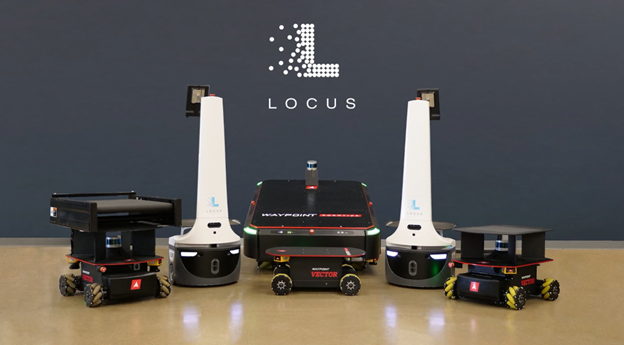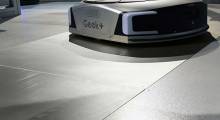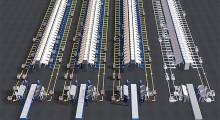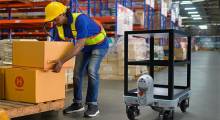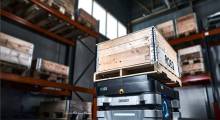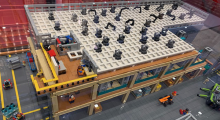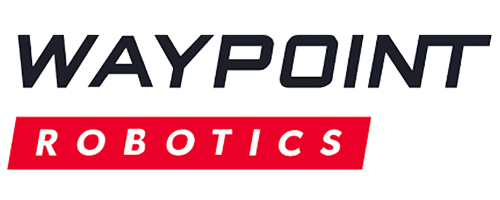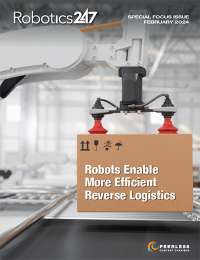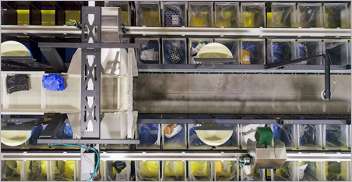Locus Robotics Corp., which supplies autonomous mobile robots, or AMRs, for fulfillment centers, today said it has acquired Waypoint Robotics Inc., which makes industrial-strength, omnidirectional mobile robots. The companies did not disclose terms but said the combination will enable them to better serve both warehouse and manufacturing operations.
“Locus is the proven leader in the development of highly productive and innovative AMR technology that efficiently solves our customers’ needs for total warehouse optimization,” stated Rick Faulk, CEO of Locus Robotics. “As order-fulfillment and labor shortages continue to grow around the world, the acquisition of Waypoint Robotics will accelerate our ability to meet these global needs in just months rather than years, helping us drive the digital transformation of the warehouse.”
Locus Robotics said its multi-robot system includes AMRs that can collaborate with human workers to double or triple piece-handling productivity. The Wilmington, Mass.-based company recently marked a half-billion units picked and raised $50 million in funding.
It said it can help retailers, third-party logistics providers (3PLs), and specialty warehouses meet or exceed increasing fulfillment demands. Locus added that its LocusBots and software can integrate into existing environments without disrupting workflows.
Locus and Waypoint share technical, customer focus
“Waypoint shares Locus’ commitment to technology excellence in pursuit of customer success,” said Jason Walker, CEO of Waypoint Robotics. “We’re excited to contribute to the expansion of the Locus product family in order to deliver a broader range of solutions, as well as access to new market segments.”
Waypoint Robotics said its omnidirectional mobile robots are designed to be easy to use, interoperable with other robots, and compatible with modules and accessories for numerous industrial applications.
The Nashua, N.H.-based company added that its Vector and heavy-duty MAV3K robots can communicate with Internet of Things (IoT) devices throughout a facility and augment worker capabilities so they can focus on higher-value tasks.
“Waypoint has amazing engineering,” said Kary Zate, senior director of marketing communications at Locus Robotics. “The synergy between our two companies allows us to expand into different use cases. For example, we can envision using a MAV3K or a Vector to unload a truck and bring items to a sorting location, where they would then be picked up by LocusBots for putaway and shelving.”
“I've always admired Locus—because they spun out of Quiet Logistics, they knew exactly what the market needed,” Walker told Robotics 24/7. “We started both companies at the same time, and there's no overlap between the technologies we've developed. We're perfectly complementary, which is why it was obvious that this acquisition is a good thing.”
Customers demand more AMR capacity
Over the past few years, several mobile robot vendors have released larger models in response to market demand for pallet handling.
“We've had a lot of customer requests for increased capacity for robots,” Zate told Robotics 24/7. “We've been looking in that direction with our current robots—it's not just the e-commerce boom and labor shortages [prompting AMR] market growth.”
“Other companies have come out with heavy-duty AMRs, but we've heard that they didn't get traction,” said Walker. “It has a lot to do with the form factor. MAV3K is succesful where others weren't because its ability to move in any direction at any time is key.”
“Think of the LocusBots, which can weave around one another and next to people and are able to move through tight, variable situations very quickly,” he said. “With the larger MAV3K, all the spaces are tighter. If it was differential drive, it would be difficult to veer left or right, let alone turn around, but MAV3K can slide without turning around. There's a hunger in the community for this ability.”
Applications and software
Locus Robotics said its acquisition of Waypoint Robotics will broaden its AMR product line to address case and pallet picking in e-commerce, as well as scenarios requiring larger, heavier payloads and fulfillment modalities.
“Think of the wide array of things a distribution center or 3PL has to handle,” said Walker. “Locus has perfectly solved everything under 40 lb. While Amazon and Shopify bought their own robotics companies, if you order from a place that sells only, say, bracelets, it's obvious. However, most e-commerce retailers have eaches, samples, and cases—an array of products that need to be picked, with physical size and weight that vary widely.”
“The model that Locus uses could be extended to heavier-payload robots,” he said. “Instead of picking socks to a tote, you could pick a case of soup to a big robot, building a mixed pallet as you go. By the time a pallet gets to outbound, you could grab shrink wrap and use MAV3K to pick, pack, and ship it. We can take this puzzle that Locus has solved and the pieces that Waypoint has built, and they'll just work.”
While Waypoint provides strong robots to meet manufacturers' needs, Locus has carved out its own niche with hardware and software for supply chains, noted Walker.
“We had always developed everything that nobody else had, not what everyone else had,” he said. “But when you talk about integration with WMS [warehouse management systems] and WES [warehouse execution systems], we'd need an additional company, because we focused on the hardware we're uniquely able to deliver.”
Locus, Waypoint scale to growing global market
Locus has benefited from the rapidly maturing market for AMRs, as it plans to expand globally.
“Five years ago, at our first trade shows, people would say, 'It's cool; what is it?'” recalled Zate. “Now, they say, 'We get it. Which is the right one for me?' That's a big shift.”
“The market has validated our business model,” he added. “Robotics as a service [RaaS] has opened doors for folks to get into automation because it overcomes the financial burden. At the end, the product has to perform. It's the 'flywheel effect'—the more AMR users have success, others will see it's not a trial but real and here to stay.”
“Locus is opening its European headquarters in Amsterdam next month,” Zate said. “We're looking for opportunities for Waypoint internationally as well. Our product teams are assessing the right applications for different markets, and we expect to introduce Waypoint late in the first quarter of 2022.”
“It's a sprint pace at a marathon distance. One of the things I'm proud of the Waypoint team is that it has built products and the company to be able to scale,” said Walker. “It's difficult to build things for scale when you're doing it at low volume, but some things will get easier and more economical now. Waypoint is always trying to de-risk the bill of materials. It's a general strategy baked into our standard practices that turned out to be lucky.”
DHL welcomes wider portfolio
DHL, which has over 1,400 warehouses and offices in more than 55 countries and territories, recently signed a 2,000-bot deal with Locus as part of its efforts to digitalize its supply chain processes.
“DHL Supply Chain and Locus Robotics have established a productive partnership based on a highly successful integration of the Locus autonomous mobile robot solution into our customers’ operations, and we value the emphasis they have placed on listening to our needs,” said Sally Miller, CIO of DHL Supply Chain North America. “This acquisition, which adds a larger, heavier-weight autonomous robot capability to their portfolio, is a good reflection of how they continue to address the customer requirements at the heart of their strategy.”
“I believe it will open up promising new opportunities in our partnership, support DHL’s ongoing efforts to deploy technologies that improve our customers’ supply chains, and contribute to the continued advancement of a competitive robotics market,” she said.
Increasing collaboration for environments and employees
“Ease of use” has been a mantra for many mobile robot suppliers over the past few years, but both Locus and Waypoint have made it part of their technology and business models as they approached logistics and manufacturing customers.
“For a number of years, the AGV [automated guided vehicle] market had to provide guidance for different installations,” said Zate. “Now, AMR technology is so sophisticated, having an AMR replace and AGV is almost a no-brainer because of easier installation.”
“We're really well-positioned now to bring full-service offerings to segments beyond our four key markets of 3PLs, retail, healthcare, and industrial,” he added. “Manufacturing was slow for us, but Waypoint opens the door.”
“We want to continue to serve Waypoint's customers with our unique capabilities,” Walker said. “We want to bring the same benefits to the manufacturing market as Locus has brought to warehousing.”
Both Locus and Waypoint have described their robots as collaborative. “Everyone's instinct was to be careful around robots, driven by fast and powerful early industrial arms,” explained Zate. “A central point of what we've developed in our software stack—navigation in the dynamic warehouse—is to allow LocusBots to work near humans with no more risk than bumping into another human.”
“Robots are great, and we think ours is better than anything else out there, but we have to be honest about the technology that's affordable for the applications we're going after,” Walker added. “We have to recognize that robots have limits and still need help. If we think about the businesses that can't find labor, it only makes sense to make the robots easier to be helped by the people helped by those robots.”
“We've always had the philosophy of 'What would Bobby do?' in thinking of the user first,” he said. “Waypoint's team really took that to heart.”
Support and partnerships to continue
Both Zate and Walker said that the Waypoint brand will continue for the time being. “We'll keep doing what we're doing well,” said Walker.
“Rick Faulk will continue to be CEO of Locus, and Waypoint's leadership team and ours will come together,” Zate said. “Our teams are working together to showcase robots side by side in our booth at shows.”
In addition, Waypoint's engineers will have access to Locus' resources. “One nice thing about people working remotely is that nobody has to relocate,” said Zate. “People can work semi-remotely or in New Hampshire or Massachusetts as needed.”
“One of the great things from the Waypoint side is its ability to deploy robots on site,” he noted. “It can ship a robot to a customer, who can configure it right out of the box. There's no user guide, just a quickstart guide. We see synergy for our systems and integrating data capture. Putting MAV3K into our dashboard for a full picture in real time is a huge asset for customers and product-development teams on both sides.”
In addition, Waypoint and Locus said their existing partnerships, such as Waypoint's with power management company WiBotic for the EnZone wireless charger, will continue.
“Everybody in robotics knows that conductive charging has problems,” Walker asserted. “Pieces rub and wear out, get dirty, and don't conduct. We wanted Bobby to not have to think about batteries. If we scale a wireless solution to market, with thousands of robots a year instead of hundreds, that starts to transform the economic equations.”
Customers can expect support to continue as robotics availability spreads, said Zate. “One special thing about this transaction is that this is the first time in the industry that an AMR company was acquired by someone other than a corporate investor, such as Fetch and Zebra,” he said. “We're still growing.”
About the Author
Follow Robotics 24/7 on Linkedin
Article topics
Email Sign Up

